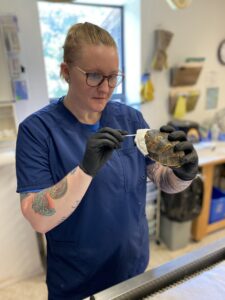The Wildlife Clinic at the Schuylkill Center, the city’s only wildlife rehabilitation clinic, is located on Port Royal Avenue in Upper Roxborough and staffed by an extraordinary group of dedicated workers, both employees and volunteers, who handle thousands of injured, sick, and orphaned animals annually. It’s a labor of love.
Separately, the Schuylkill Center this summer unveiled our mudhif, a traditional Iraqi guesthouse built of reeds– the first one ever built outside of Iraq. In memory of this year’s 20th anniversary of 9/11, the Center last weekend offered “Reconciliation: A Healing Encounter,” where veterans, Iraqi immigrants, and the public gathered to heal from the injuries of war and the socio-political unrest in Iraq and adjacent countries.
Our clinic and mudhif came together at Reconciliation, as Liz Ellmann, the clinic’s assistant director and an Army veteran, led nature walks for the event.
Liz, who uses “they” and “them” pronouns, has been with us for almost three years now, one year as a volunteer and intern and the last two as an employee. A resident of Roxborough-Manayunk, “Liz has been a vital part of keeping the clinic going through our tough COVID months,” noted Chris Strub, the clinic’s director. “Their care and compassion for our patients, along with their incredible organizational skills, help keep everyone on track with keeping our patients cared for and our clinic running smoothly.”
For Liz, it has been quite the journey from the Army to a wildlife clinic in Roxborough. “I was in the active Army for eight years,” they told me as we drank coffee outside the mudhif. While stationed mainly in Fort Hood Texas, Liz was deployed to Kuwait, South Korea, and Germany. They were assigned Patriot missiles: “we would place them, fix them, reload them; I was this little person next to a huge canister of missiles.” They were also “armor for my unit, in charge of all the weapons and ammo. I loved it, was good at it, and in South Korea I was asked to lead workshops on this.”
They accompanied a medivac full of injured servicemen from Kuwait to Germany, and was also assigned funeral detail, accompanying coffins on their sad journeys home. “My first one was a 19-year-old kid just married with a newborn kid and only there for two weeks,” Liz shared. “These are your brothers and sisters, you know why they did what they did. They made the ultimate sacrifice, and you can’t take that away from their families.”
But they blew out their knee in Kuwait on their last deployment, “where I had no ligament left and tore my meniscus in half. There were complications from my surgery, giving me bad migraines. I had wanted to stay in and do my 20 years; I had dreams, things I wanted to do, but they could not figure out what was wrong. So I got medically retired out as a sergeant.”
From Ashland, Virginia, Liz grew up in a small town 45 minutes north of Richmond that had “tons of farmland; we had a cornfield in front of the high school.” After the Army, wanting to get back to the East Coast closer to their roots and work on a college degree, they enrolled in Drexel (“what they do with veterans is absolutely amazing”) which brought Liz to Philly. Now armed with a Bachelor’s in psychology and a Master’s in spatial cognition, they were looking for an entry into the psychology field, which isn’t easy. But their wife showed Liz an announcement for an internship at the Wildlife Clinic. “You’ve always loved animals,” she told Liz. They agreed. The internship “really clarified things for me.” Rebecca Michelin, the previous clinic director who first hired Liz, “was huge in helping me figure it out, being an amazing mentor in helping me decide. And this was the right decision.”
“I absolutely want to be doing this, and feel a passion and purpose. I see such a lack of good information and knowledge that our industry”– wildlife rehab– “even exists.” Liz also sees so many well-intentioned people finding an injured animal, or one they assume is orphaned, and doing the wrong thing. “They Google solutions– and Google is like the death of everything. It’s not malicious, people are trying to help, but they end up not helping so much.” Like by taking a baby that one assumes was abandoned away from its parents, when they might have left it alone.
When Liz heard first about the mudhif coming to the Schuylkill Center, “I was so excited. There is such a stigma and stereotype with people from the Middle East; people assume everyone there is an extremist or a terrorist. So the mudhif is a healing point, and everyone has a lot of healing to do, especially veterans, as we have our own issues. To have a place like this, it’s sacred. There needs to be a bridging point not only within the community but with the world. The September 11 event is so important,” they continued. “There needs to be an opening of arms.”
The loss of soldiers last week in Afghanistan is “devastating, just devastating. Once again they’re all kids who made the ultimate sacrifice trying to save innocents. It’s gut wrenching.” To memorialize the loss, Liz has “tied yellow ribbons on my front porch for each of the fallen, and added one for the innocent Afghan people. They feel like we abandoned them– and actually we did.
“At day’s end,” Liz finished, “we all bleed the same blood, and need to protect each other.”
That fierce protectiveness is exactly what the Wildlife Clinic needs in a rehabilitator, someone who will move heaven and earth to save even the tiniest mouse or sparrow. For me, the Schuylkill Center is so proud of Liz’s service to the country, and so honored to have them on our team. Thank you, Liz.
Mike Weilbacher directs the Schuylkill Center for Environmental Education in Upper Roxborough.

